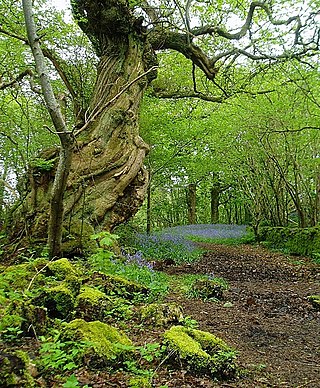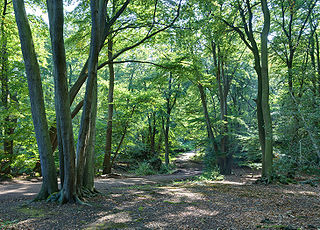Related Research Articles

Bracknell Forest is a unitary authority area in Berkshire, southern England. It covers the two towns of Bracknell and Sandhurst and the village of Crowthorne and also includes the areas of North Ascot, Binfield, Warfield, and Winkfield. The borough borders Wokingham and the Royal Borough of Windsor & Maidenhead in Berkshire, and also parts of Surrey and Hampshire.

This page gives an overview of the complex structure of environmental and cultural conservation in the United Kingdom.

The Woodland Trust is the largest woodland conservation charity in the United Kingdom and is concerned with the creation, protection, and restoration of native woodland heritage. It has planted over 50 million trees since 1972.
The Forestry Commission is a non-ministerial government department responsible for the management of publicly owned forests and the regulation of both public and private forestry in England.

The Department for Environment, Food and Rural Affairs (DEFRA) is a department of His Majesty's Government in the United Kingdom responsible for environmental protection, food production and standards, agriculture, fisheries and rural communities in the entire United Kingdom. Concordats set out agreed frameworks for co operation, between it and the Scottish Government, Welsh Government and Northern Ireland Executive, which have devolved responsibilities for these matters in their respective nations.

The Department for Culture, Media and Sport (DCMS) is a department of His Majesty's Government, with responsibility for culture and sport in England, and some aspects of the media throughout the UK, such as broadcasting.

In the United Kingdom, ancient woodland is that which has existed continuously since 1600 in England, Wales and Northern Ireland. Planting of woodland was uncommon before those dates, so a wood present in 1600 is likely to have developed naturally.
Forest school is an outdoor education delivery model in which students visit natural spaces to learn personal, social and technical skills. It has been defined as "an inspirational process that offers children, young people and adults regular opportunities to achieve and develop confidence through hands-on learning in a woodland environment". Forest school is both a pedagogy and a physical entity, with the use often being interchanged. The plural "schools" is often used when referring to a number of groups or sessions.

The economy of Scotland is an open mixed economy which, in 2023, had an estimated nominal gross domestic product (GDP) of £211.7 billion including oil and gas extraction in Scottish waters. Since the Acts of Union 1707, Scotland's economy has been closely aligned with the economy of the rest of the United Kingdom (UK), and England has historically been its main trading partner. Scotland still conducts the majority of its trade within the UK: in 2017, Scotland's exports totalled £81.4 billion, of which £48.9 billion (60%) was with the countries of the United Kingdom, £14.9 billion with the European Union (EU), and £17.6 billion with other parts of the world. Scotland’s imports meanwhile totalled £94.4 billion including intra-UK trade leaving Scotland with a trade deficit of £10.4 billion in 2017.
The Building and Wood Workers' International (BWI) is the global union federation of democratic and free trade unions in the building, building materials, wood, forestry and allied industries.
The Royal Forestry Society (RFS) is an educational charity and one of the oldest membership organisations in England, Wales and Northern Ireland for those actively involved in woodland management.

The Sylva Foundation is an environmental organisation focusing on trees and forestry established in 2006, and registered as a charity in England and Wales in 2009 and with the Office of the Scottish Charity Regulator in 2010. The organisation was co-founded by Sir Martin Wood and Dr Gabriel Hemery. Its office is at the Sylva Wood Centre in Long Wittenham in Oxfordshire, England.

The United Kingdom, being in the British Isles, is ideal for tree growth, thanks to its mild winters, plentiful rainfall, fertile soil and hill-sheltered topography. In the absence of people, much of Great Britain would be covered with mature oaks, except for Scotland. Although conditions for forestry are good, trees do face damage threats arising from fungi, parasites and pests. The development of afforestation and the production and supply of timber in Wales come under Natural Resources Wales, as set out in the Forestry Act 1967.

Scotland is ideal for tree growth, thanks to its mild winters, plentiful rainfall, fertile soil and hill-sheltered topography. As of 2019 about 18.5% of the country was wooded. Although this figure is well below the European Union (EU) average of 43%, it represents a significant increase compared to the figure of 100 years previously: in 1919 it was estimated that only 5% of the country's total land area was covered in forest. The Scottish Government's Draft Climate Change Plan has set an aim of increasing coverage to 21% of Scotland by 2032, with the rate of afforestation rising to 15,000 hectares per year by 2024.
Forestry in Wales is the practice of planting, managing, and caring for forests in Wales.

Scottish Forestry is the public body responsible for forestry regulation, policy and support to private landowners in Scotland. It was formed on 1 April 2019, to take over some of the responsibilities of Forestry Commission Scotland, which was dissolved. Scottish Forestry exists alongside Forestry and Land Scotland, also established on 1 April 2019, which is responsible for managing and promoting the National Forest Estate.

Federalism in the United Kingdom aims at constitutional reform to achieve a federal UK or a British federation, where there is a division of legislative powers between two or more levels of government, so that sovereignty is decentralised between a federal government and autonomous governments in a federal system.
Afforestation efforts in Scotland have provided an increase in woodland expansion. By the 20th century mark, Scotland had diminished woodland coverage to 5% of Scotland's land area. However, by the early 21st century, afforestation efforts have increased woodland coverage to 17%. The Scottish government released their Draft Climate Change Plan in January 2017. The 2017 draft plan has increased the targeted woodland coverage to 21% by 2032 and increases the afforestation rate to 15,000 hectares per year.

Welsh devolution is the transfer of legislative power for self-governance to Wales by the Government of the United Kingdom.
References
- ↑ "Forestry Commission Scotland - the Scottish Forestry Strategy". Archived from the original on 26 June 2009. Retrieved 31 May 2009.
- ↑ "Archived copy" (PDF). Archived from the original (PDF) on 15 April 2009. Retrieved 31 May 2009.
{{cite web}}: CS1 maint: archived copy as title (link) - ↑ "Archived copy" (PDF). Archived from the original (PDF) on 30 May 2009. Retrieved 30 May 2009.
{{cite web}}: CS1 maint: archived copy as title (link)